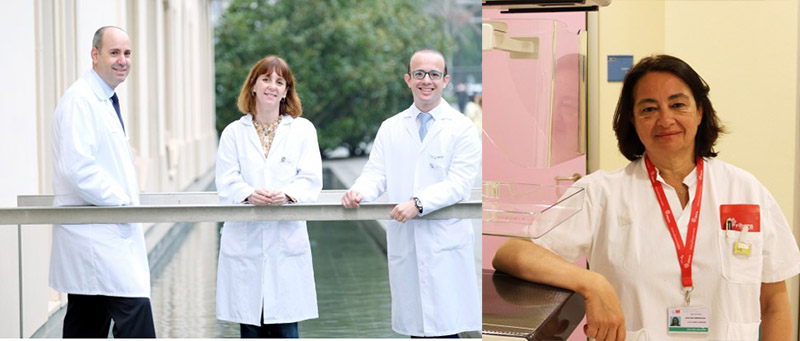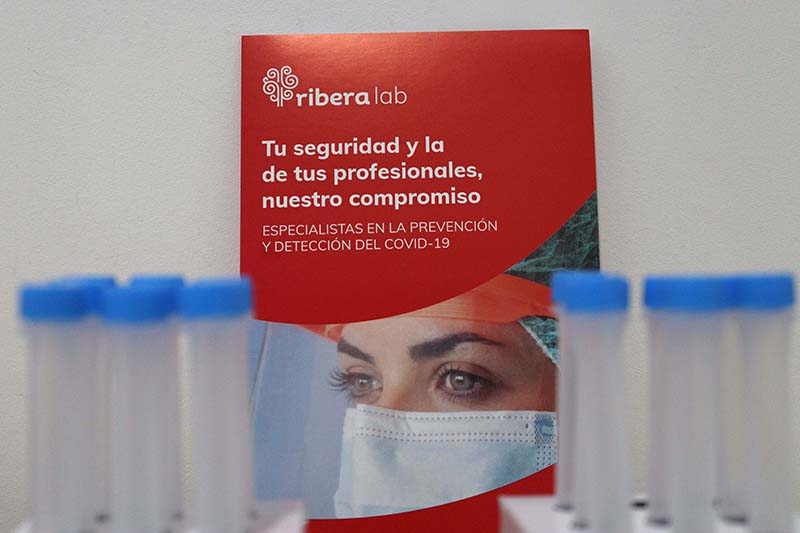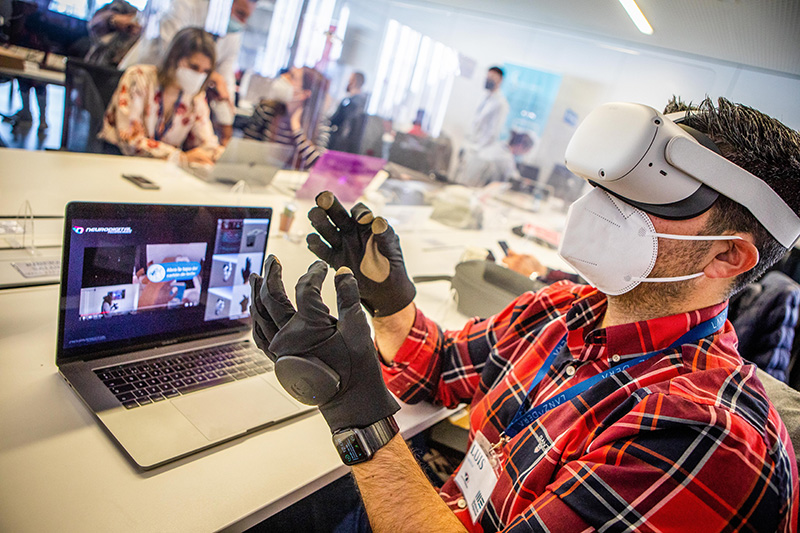
by S0p0rt3 | Sep 24, 2021 | Ribera |
- The healthcare group have signed an agreement with the International Breast Cancer Center so that their patients can access clinical trials, innovative drugs and translational, national and international research projects that Doctor Cortés leads.
- The Ribera group’s Breast department is already a benchmark in terms of technology, Radiology, Pathology and Oncoplastic Surgery with its 3D contrast-enhanced mammograms, rapid breast biopsies, genetic signatures, breast-conserving surgery and nipple tattooing.
Valencia, 16th, September, 2021 – The Ribera healthcare group and the International Breast Cancer Center (IBCC), in Barcelona, have signed an agreement in order to incorporate the experience and knowledge of Javier Cortés’ team of oncologists and researchers into Ribera’s Breast Department, which Julia Camps manages. Thanks to this strategic alliance, the breast cancer patients from Ribera’s hospitals will be assessed at the Tumor Committee by the IBCC professionals, which have joined the multidisciplinary Breast Department team, and will have access to clinical trials, innovative drugs and translational, national and international research projects, led by Doctor Cortés.
The IBCC is the first center in Spain that is hyperspecialized in the treatment of breast cancer, led by Doctor Javier Cortés and his team, created from a global, humanistic and scientific point of view, with more than 20 years of experience in research and breast cancer treatment.
Ribera group’s Breast Department is already a benchmark in terms of technology, Radiology, Pathology and Oncoplastic Surgery and brings together 50 professionals from different departments, with more than 20 years of experience in breast pathologies. Their work is based on knowledge shared through the breast committees of the different (translational) hospitals, providing patients with personalized healthcare and the best specialists in order to assess each case in a collaborative way. Networking from Ribera’s different hospitals, provides patients with innovative technology, such as their 3D contrast-enhanced mammograms, pioneering techniques such as rapid breast biopsies and genetic signature in the initial biopsy, as well as specific surgical approaches (precision medicine), emotional support and nipple tattooing, amongst others.
“The addition of the knowledge and experience of the IBCC and Doctor Cortés’ team to the Ribera group’s Breast Department is a milestone that allows us to offer our patients hyperspecialized, innovative and cutting-edge healthcare in the diagnosis and treatment of this pathology”, explains Doctor Julia Camps, the Corporate Chief of the Breast Department, who added that “ours has been a natural alliance”. “We are the perfect partners, we share the same philosophy and values, vocation of service and excellence, experience, involvement, professionalism, vanguard and innovation”, affirms Doctors Camps, who reiterates that personalized healthcare and the monitoring of patients, as well as precision medicine (the appropriate treatment, at the right time) is key for both entities.
“I think that it is a fantastic opportunity for everyone, for the IBCC, which is exclusively specialized in breast cancer; for the Ribera group; and, ultimately, for the patients of this cancer”, Doctor Javier Cortés states.
He points out that “the Ribera group is very serious about patient care, the logistics of patient care, so that they are well taken care of, truly, and they have the best imaging strategies, with rapid diagnoses and, furthermore, of good quality” and he adds that “if they ask me why Ribera, I say because they have firmly committed to breast pathologies and because it is Julia Camps who manages and coordinates this department, objectively recognised as one of the world’s leading authorities regarding MRIs of the breast, together with a team of brilliant professionals”.
Therefore, by combining the efforts of the two groups and optimizing the best of each, we believe that we can become leaders in Spain from both a healthcare and clinical research point of view, at least in breast cancer, for the time being”, highlights Doctor Cortés.

by S0p0rt3 | Sep 24, 2021 | Ribera |
- The hospitals of Ribera Polusa and Ribera Santa Justa are putting a Cosmetic Medicine and Surgery and Cosmetic Treatments Department into place in their health centres in Lugo and Villanueva de la Serena (Badajoz).
- The hair transplants, carried out by renowned professionals, with cutting-edge techniques, are a definitive solution for 98 percent of cases of androgenetic alopecia, both in men and women.
Valencia, 26th, April, 2021 – The Ribera healthcare group has set up a new line of services, Ribera Aesthetics, in Ribera Polusa (Lugo) y Ribera Santa Justa (Villanueva de la Serena) hospital, with a special focus on this initial phase for the Hair Transplant Unit. This new area will include cosmetic medicine and surgery and cosmetic treatment services, with all the assurance that a multi-disciplinary team implies, and with the majority of healthcare professionals present, as well as their hospitals’ surgical and medical equipment.
The hair transplant unit, which now attends to patients in both centers, is highly specialized, has certified, renowned professionals, and carries out these interventions with cutting-edge techniques, which provide a definitive solution in 98 percent of cases of androgenetic alopecia, both in men and women. Doctor Carlos Caballero leads this Hair Transplant Unit whose objective is, as he explains, “to help correct alopecia, baldness or the loss of thickness, both in men and women, with implants, since they are a very efficient, definitive solution and they provide a high level of patient satisfaction”. Doctor Caballero points out that, although there is a significant percentage of male patients, “androgenetic alopecia in women is very frequent, with a significant genetic component, but in addition, they tend to suffer from more noticeable psychological consequences than men”.
The Ribera group’s hospitals’ Hair Transplant Unit provides a free initial consultation and guarantees that you are placed in the hands of a qualified professional. Doctor Caballero warns of the dangers of intrusiveness in this discipline and places value on the high level of specialization of this unit in the Ribera group’s hospitals. “We sometimes have to fix real disasters, when patients put themselves in the hands of fake specialists”, he affirms, whilst reminding us that a hair transplant is a surgical act, which requires a specialist, nursing staff and specific equipment.
A hair transplant is a procedure which entails transferring or transplanting follicular units or follicules – also known as grafts – from the back and side areas of the scalp – occipital and temporal parts of the head – to the frontal area, which is the most susceptible when experiencing baldness or alopecia. “We take hair from the back of the scalp, which is free from androgen receptors, not susceptible to loss due to hormonal actions, to implant it at the front, for receeding hairlines, and in the central section as well as the crown”, as the expert of the Ribera Group explains.
The most important thing, he assures, is to provide a solution to the specific problem of each patient. Therefore, he adds, “the first thing that we do is a trichocopy, a study in which, with a digital microscope, which includes a densitometer, we assess the donor area, the density and the quality of the follicles”. In addition, he explains, an aesthetic design is agreed upon with the patient, as long as it is feasible from the professional’s medical point of view, before proceeding with the extraction and transplant.
For Doctor Caballero preparation prior to the procedure and patient follow-up is also very important. “We do not just do the surgical procedure and that’s that. We want the best results for our patients and, therefore, we offer pre and post-plasma surgery treatments, rich in platelets and blood plasma growth factors from the patient themselves (PRP), capillary mesotherapy with vitamins, and others, as well as a follow-up and complete medical evaluation, which can guide the treatment both pre and post-procedure which is required in a personalized way in each case”, the specialist affirms. Hair implants for eyebrows and beards are also done.

by S0p0rt3 | Sep 24, 2021 | Ribera |
- The Ribera healthcare group’s laboratory division recommends taking this test between 14 and 21 days after having been vaccinated with the final dose of the vaccine or any time after that period.
- It is a standard blood draw, it is not necessary to fast and the results are available 48 hours after having the test.
Valencia, 14th, April, 2021 – Ribera Lab, the laboratory division of the Ribera healthcare group, has broadened their portfolio of services with the new post-vaccination test, which allows them to confirm the presence of antibodies against Covid and, therefore, the exact immunity of each person to the virus. This test quantifies the IgG directed at the SARS-CoV2 spicule, Coronavirus, which makes it an objective and trustworthy indicator of the level of antibodies acquired after the vaccination and confirms its effectiveness.
Vaccination figures in Spain were at 14.3% on Friday, which means that more than three million people have been vaccinated. However, it is hoped that this figure will increase significantly over the next few weeks, if the the doses of the current vaccines, and that of the new Janssen vaccine, which also only requires one dose, arrive as expected. It is due to this that the blood collection points that Ribera Lab has in its centers, distributed around the majority of Spain, are providing this post-vaccination test from this week.
Ribera Lab’s professionals recommend having this test between 14 and 21 days after having been vaccinated with the final dose of the vaccine. “There isn’t a problem after this period of time either, for example, one month after having received the final dose, because the up-to-date studies that have been carried out confirm that there are people that develop antibodies after 10 days and others after 21 days, as they use tests that quantify the IgG after the person has been exposed to the virus”, they explain.
The post-vaccination test is a simple and painless test. The Ribera Lab professionals take a standard blood sample, like in a blood test, as they only need a milliliter of serum.
Results are available 48 hours after the blood draw. And, in addition, it is not necessary to fast before the test because food consumption does not interfere with the result.
With all eyes on the upcoming de-escalation and with the aim of guaranteeing that the elderly in particular have the necessary immunity to ensure that they are protected against the virus, this test is recommended.
The Ribera Lab centers that carry out this type of test are located at the Immunological Centre of San Juan (Alicante), and at Ribera Polusa, Ribera Santa Justa and Ribera Almendralejo hospital, in the provinces of Lugo and Badajoz respectively. All of the information regarding this test, and above all those that can detect Coronavirus, is available here.

by S0p0rt3 | Sep 24, 2021 | Ribera |
- “Remote hospitals” are the first challenge for startups in this new hub which Juan Roig’s business accelerator has put in place and which unites a group like Ribera with technology companies in order to develop projects in the health sector.
- From now until June, the startups can present proposals regarding how to improve monitoring and communication with patients outside the hospital. They will carry out their projects in the group’s hospitals from September.
Valencia, 13th, April, 2021 – The Ribera healthcare group has set their two first technological challenges of Lanzadera‘s new Health Innovation Hub, aimed at looking for creative, practical and viable startup solutions regarding “remote hospitals”, together with Amazon e IBM, which act as facilitators, providing their technology and knowledge in order to generate solutions with a very wide scope.
Within this concept of “remote hospital” we can find all of those applications that, using Artificial Intelligence, IoT (The Internet of Things), voice technology or natural language processing, enable improvements to the monitoring of patients and communication with them, without them needing to go to the hospital, as well as the development of predictive models for early diagnosis.
Ribera already has experience with applications that take healthcare to where the patient needs it, after developing pilot startup projects in their hospitals, chosen together with Lanzadera in their corporate program. Now, within this Hub, they have gone one step further by having technology facilitators, such as Amazon Alexa and IBM, which will give support to new projects. Furthermore, the technology affiliate of the group, futuRS, has developed predictive models, such as that which warns of Covid patients that may end up in ICU, in order to bring forward decision making and avoid any deterioration.
Lanzadera, the business accelerator driven by Juan Roig, with this Health Innovation Hub, is putting an initiative in place in which companies like Ribera propose challenges and technology partners facilitate the development of solutions for startups. As with the corporate agreements, the companies are responsible, together with Lanzadera, for choosing the enterprises that will innovate this sector. In this case, the startups will be able to present their proposals until June, and those chosen will begin to develop their projects in the group’s hospitals from September.
The hubs will be partly focused on dissemination, both through periodic seminars and round tables and through sectorial reports. “We will provide more opportunities through the Health Hub to make startups grow by large enterprises supporting them in successful technology”, Javier Jiménez, the General Director of Lanzadera, explains.
“This Health Hub is of great value in the creation of an ecosystem of innovation and is going to enable us to identify new needs, create synergies with large technological enterprises and, above all, to generate knowledge regarding healthcare innovation”, Manuel Bosch, Chief Information and Innovation Officer of the Ribera group, affirms.
About Marina de Empresas/ Lanzadera
The incubator and accelerator of Lanzadera startups, together with EDEM Business School and the investment society Angels, forms part of the Marina de Empresas hub of entrepreneurship. It is one of Juan Roig’s initiatives, located at Valencia’s marina, which aims to train, advise and finance the entrepreneurs of today and of the future and is committed to the creation of wealth, employment and the promotion of entrepreneurial culture. Since its creation in 2013, Lanzadera has supported more than 600 startups, providing more than 15 million euros in financing in the form of loans. Across all of them, they have managed to generate more than 3,250 direct jobs, as well as an external investment of over 130 million euros. To form part of the program, entrepreneurs can send their project to www.lanzadera.es at any time.
About Ribera
Ribera is a business group founded in 1997, specialized in the management of innovative health projects. With more than 6,400 professionals, their objective is to transform the way of working and innovate healthcare management in order to improve the health and well-being of the population. They have developed a management model that provides value to society and contributes to the sustainability of healthcare systems, which is studied as a success story in well-known international universities such as Harvard Business School or Berkeley. In Spain, Ribera is present in four autonomous regions and manages eight hospitals, four of which are university hospitals, and more than 60 health centres in the Valencian Community, the Community of Madrid, Galicia and Extremadura. They have various projects at an international level, as well as a purchase center, Ribera B2b salud, a laboratory division, Ribera Lab, and a technology division, Futurs. Ribera’s shareholders are the American insurance company Centene Corporation (90%) and Banco Sabadell (10%).

by S0p0rt3 | Sep 24, 2021 | Ribera |
- It is the first one to be set up in the Lugo province and it has the capacity to accommodate patients from the whole Galician province.
- This high- resolution hospitalization has a multi-disciplinary team composed of specialists in rehabilitation, neurophysiotherapy, neuropsychology, neuro speech therapy and occupational therapy.
- This service provides 24 hour medical attention to those who have suffered a stroke, need post-covid rehabilitation or after a surgical intervention in order to help them recover.
Lugo, 26, February, 2021. – Ribera Polusa hospital has created an Acquired Brain Damage and Functional Recovery Unit in order to treat patients with neurological injuries that they have suffered after a stroke, as a consequence of Covid or after a surgical intervention in a multi-disciplinary, integrated and intensive way.
The new unit is a pioneer in the Lugo province and has the capacity to accommodate patients from the whole Galician province. It is targeted at functional recovery for those with acquired brain damage and has a multi-disciplinary team composed of specialists in rehabilitation, neurophysiotherapy, neuropsychology, neurospeech therapy and occupational therapy.
The team is supervised by Carlos García Porrúa, the medical director of Ribera Polusa, who has highlighted that the unit has been created to deal with the serious problem that patients face when they have suffered brain damage and they don’t have the independence to return to everyday life. “A neurological injury involves a series of problems that range from those related to motor, language or attention deficit to difficulty feeding oneself or carrying out their own daily activities such as getting dressed or washing themselves ”, he explains.
After the first free assessment consultation, the Unit of Acquired Brain Damage and Functional Recovery’s team design an individualized therapeutic treatment plan, with some short and medium-term objectives to achieve, focused on regaining the patient’s function and independence, with them remaining there for as long as they are recovering.
The individualized therapeutic treatment plan, with 24 hour medical attention, includes daily work sessions in the morning and afternoon with various specialists in order to regain physical mobility, functional, cognitive, sensorial and psychosocial capabilities which limit the patient in day-to-day living. “The program is always adapted to the conditions of the patient and their home environment. We estimate that the improvement may be noticeable within one or two months and, after being discharged, they are then monitored as an outpatient in Polusa’s health centres, with periodic consultations to strengthen that which has been recuperated during their hospital stay”, adds Dr. García Porrúa.
Brain damage can occur after a stroke or a cerebral infarction, due to which an area of the brain is without a blood supply, which entails a series of neurological problems. It also affects those who have suffered a head trauma due to a traffic, domestic, work or sporting accident.
In addition to neurological injuries, the Unit also works on functional recovery for patients after a surgical intervention or for those who suffer consequences after having been seriously affected by Covid.
Technological innovation is present in the Unit through the remote rehabilitation program based on artificial intelligence and tactile technology which allows the patient to incorporate it into their daily routine with maximum clinical safety precautions.
There are 420,000 people with acquired brain damage living in Spain, 35,000 of whom are in Galicia. A recent report by The Spanish Federation for Brain Damage (Fedace) shows that 78% of cases were caused by a stroke and the remaining 22% by head traumas and other causes. Of those affected, 65% are over 65 years o






Recent Comments